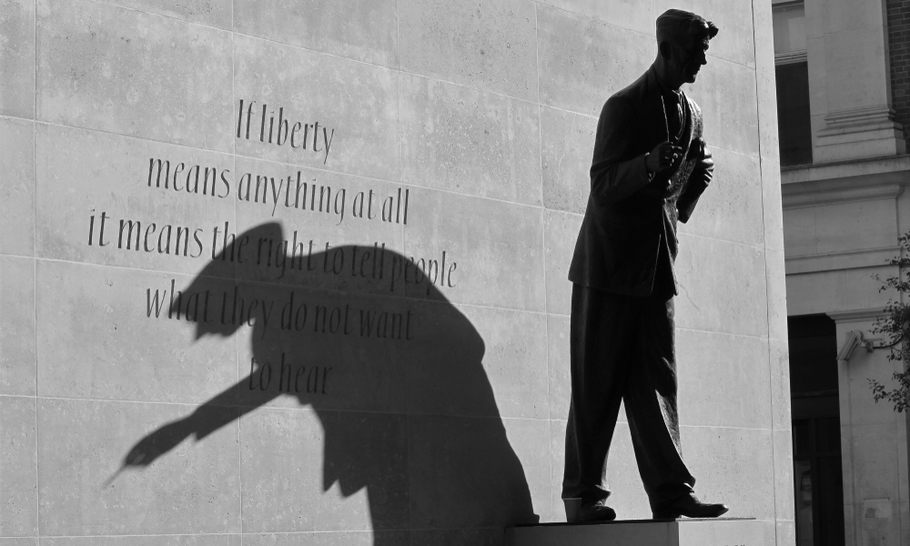Orwell and the return of the state

There are few parts of the political spectrum that have not at least attempted to take George Orwell’s legacy for themselves, or to change his central message to suit their own ends. In this crisis, which has stripped away the normal liberties of western civilisation, we should be acutely wary of distorting the man or his words; Orwell, though always vividly pertinent, cannot be generalised. As we prepare to face the largest economic downturn in modern times, and the political consequences of that, Orwell’s message remains as important as ever — if only we can divine what it was.
From his late twenties, Orwell was a democratic socialist and a critic of imperialism. He was a product of a vile but vaguely intellectual prep school, followed by Eton and then five years in the Indian Imperial Police, which he seemingly joined out of a romantic desire to see “the East”. But Orwell was perennially cynical, always ready to venture out into the worlds he despised to see reality at first hand. He went to Burma, to Paris, to the “spikes” of England, to gain experience for his views and writing. His first published book Down and Out in Paris and London is not ostensibly a polemic, but a chronicle of his time. It was a kind of call for arms, which recognised the grimness of extreme poverty. His views were intrinsically linked to such experiences.
One of the things that makes Orwell so remarkable is his extreme sensitivity. He was acutely aware of the changes that needed to occur, and saw the war as a means by which Britain could “change out of recognition and yet remain the same”. This comes in his 1941 essay The Lion and the Unicorn, at the end of which Orwell recognised that the “generation of ghosts” that ruled the country would soon be usurped by the people “in the four-ale bar and the suburban back garden”. Orwell thought the war could only produce a revolution of extremes, from either fascists or communists. In fact it was neither, but a change that evoked the spirit of the England of which he wrote. This change was achieved in large part by the 1945 election, but it was the growing sense of post-war modernity that was most important to Orwell.
What makes Orwell’s analysis so remarkable is the way he predicted the downfall of the old guard and what that would entail when the war was not anywhere near over. With his experience of the country, he was able to foresee it.
The destruction, the long torment and bitter agony of the war cannot be compared to our present crisis. But they both represent important landmarks in the nation’s history — they both make the time before seem like a different age. Any post-corona period will be radically different, as the world adapts to both the dramatic social and economic consequences. The lockdown in Britain is the single largest state measure introduced since the war, and perhaps the most restrictive and damaging ever imposed. There is a lesson there about the role of the state, the detail of which is still unclear. But its political ramifications will last for decades.
Public support for the lockdown has remained staggeringly high throughout, especially when compared to other European nations. It could easily have been assumed before the lockdown that the British would be much more reluctant to give up their freedoms, and that the calamitous effects on the young would be heavily resented. Yet the public seem genuinely incapacitated by what Orwell saw as the central experience of the citizen under totalitarian rule: fear. Fear both of the virus and the consequences of stepping back into the world.
With distancing measures likely to be in place for the long-term, the role of the state in public life will have to be reassessed. With public support for more intervention high, Johnson will be wary of letting his libertarian instincts influence future decisions. But he will know there is now public support for a system that allows state to track the movement of thousands of citizens, something more associated with a Chinese-style dictatorship than with Britain.
What Orwell wrote in Nineteen Eighty-Four has become the stuff of political cliché, and many of his maxims are overused to the point of exhaustion. But his central point was evident in many of his earlier works. Orwell, the authentic dissident leftist, believed most powerfully in freedom from the state. He was instinctively suspicious of anything that screamed of mass hysteria or the meretricious, and perhaps most of all of any second-hand beliefs.
Orwell despised the idea of believing popular opinion without the need for real thought, the idea of following the grain for the personal benefits it could bring. The most critical task for the true journalist was telling people “what they do not want to hear.”
The question now for Britain is whether the country can emerge as a nation that will face “unpleasant facts”. Or will we fall for the idea of a powerful state that resolves all problems? Either would be a dramatic shift from what we have now.




